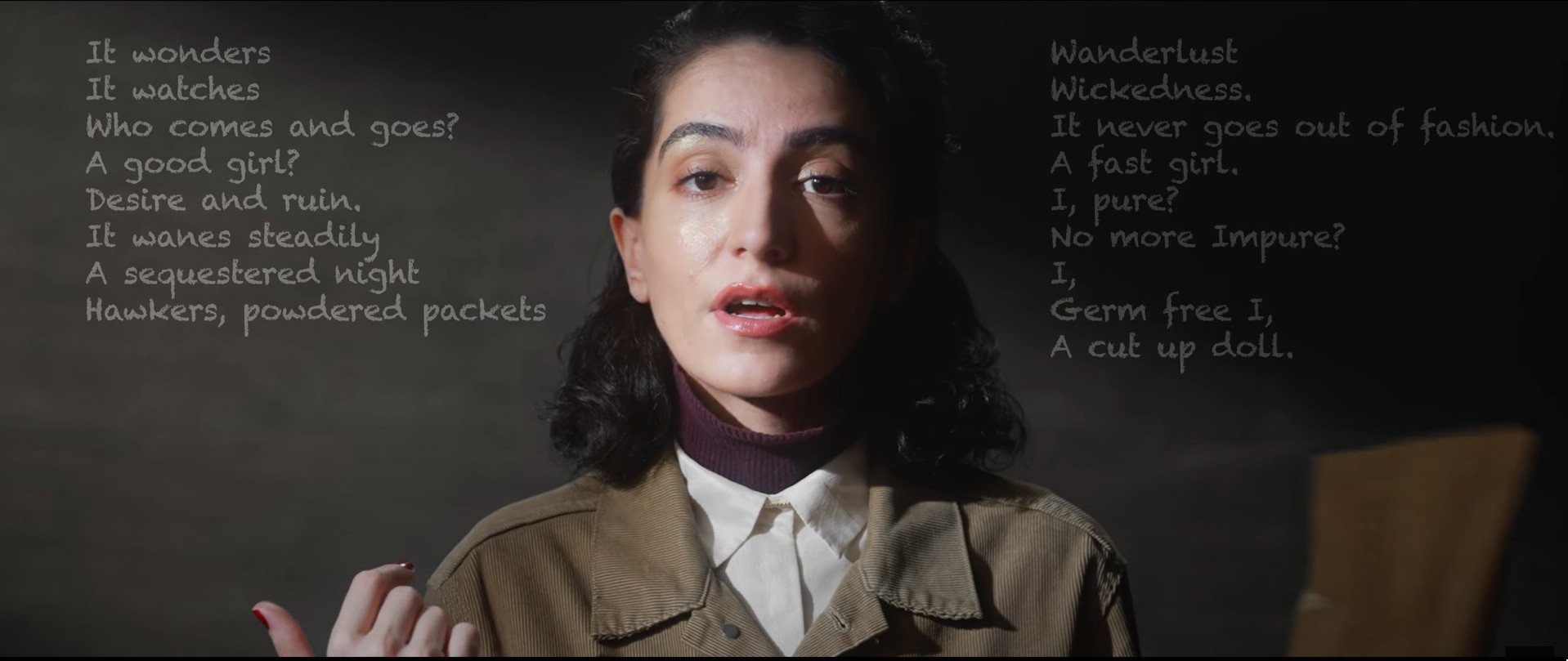PUBLISHED
October 05, 2025
In recent years, Pakistani filmmakers, especially those working in alternative cinema, have been making rounds in the international circuit. They are doing more than just telling a story; they are representing and questioning the very world those stories come from. Dealing in Desire by Saba Karim Khan and Sarmad Sultan Khoosat is that kind of film. It is just over thirteen minutes long and feels like a powerful combination: part poem, part performance, and part visual essay. It stars Rasti Farooq, who performs a woman living in a body that is both wanted and judged — always on display but never truly understood. The film is not merely inspired by Khan’s poetry; it is a direct, visceral enactment of it.
The project draws on two primary sources. One is Khan’s own poem, a raw and lyrical meditation that moves from self-scrutiny (A spider, / Lining the perimeter of / its web) to societal labels (“A good girl? … A fast girl”) and finally to a fragile hope (“a beautiful reminder, / the clearest sign to breathe, believe / exist / survive”). The other is Saadat Hasan Manto’s short story Hatak (The Insult), in which a sex worker named Sugandhi experiences a devastating rejection. Dealing in Desire fuses Manto’s theme of humiliation with the claustrophobic textures of the digital age and the intimate lexicon of Khan’s verse, showing how the “insult” has evolved but not disappeared.

Where Sugandhi was hurt by a clear act of refusal, Farooq’s character is injured by absences that echo the poem’s imagery: the “jagged rooftops, / Once alight,” now a “ghastly silhouette”; the “ghosted messages” that feel like a “sequestered night.” The pain, in both cases, comes from being dismissed, ignored, or erased. To be rejected is to have one’s very existence reduced to something disposable, to feel like “A cut up doll. / cancelled!”
The film’s visual language is a direct translation of the poem’s psychological landscape. Farooq is confined in a room that feels like the poem’s “web,” its walls strung with dangling fabrics and paper eyes that “wonder… watch… Who comes and goes?” It is a space of constant surveillance, one where privacy is impossible and selfhood feels precarious. She goes through the motions of beautification — scrubbing, washing, accessorizing — with an obsessive intensity that mirrors the poem’s fractured psyche. These aren’t acts of self-care but rituals of preparation for judgment, a way to become “germ free,” to scrub away the “blacks / yellows / browns” of perceived impurity.

Khan’s words don’t just accompany the images; they puncture the silence. The repetition of labels —“A good girl? … A fast girl. I, pure? No more impure?” — Manto’s own blunt realism echoes. It reveals how women, whether in mid-20th century Bombay or today’s Lahore, are rarely allowed to exist outside the binaries imposed on them. They are always being read, classified, and consumed.
The colour palette heightens this tension. Red here is not celebratory but ambiguous, signifying both “desire and ruin,” “wickedness,” and “naughtiness.” In a telling scene, a carefully laid-out feast of qorma and naan sits untouched, while her bed is cluttered with greasy fast-food remains. One represents the “tidy blanket” of ritual and tradition, the other the disposability of modern life. Both are metaphors for how women’s bodies are consumed: sometimes displayed as objects of reverence, other times treated as cheap and replaceable.

The atmosphere builds until it fractures, following the poem’s own arc. Tired of grooming herself for an absent audience, Farooq’s character abandons the performance. She pulls off her jhoomar, stops scrubbing at the stain, and finally gives in to her own hunger — a raw, animalistic act that is not triumphant but necessary. It is the physical manifestation of the poem’s concluding turn: “to try / to live / to feel.” If Sugandhi’s story in Hatak ended in unresolved despair, Dealing in Desire, like the poem it brings to life, allows its protagonist a fleeting form of release. It is not empowerment in a glossy sense, but a reclamation of the body’s simplest desires, a decision, “To breathe, / believe / exist / survive.”
What lingers is not a clean moral but a mood: the claustrophobia of the web, the unnerving painted eyes, the mournful thumri. Like both Manto’s prose and Khan’s poetry, which unsettle more by suggestion than spectacle, the film thrives in its ambiguities. It refuses to let us watch comfortably.
Yet, there is also the glimmer of transcendence Khan’s verse promises. The final image is not of a woman made palatable for others but of one feeding herself, on her own terms, however unpolished. In that small, messy act — like the final whisper of “sunrise” after the long “darkness”— lies the possibility of freedom.
In less than a quarter of an hour, Dealing in Desire manages to connect two eras of feminist anxiety. It is more than a short film; it is an immersive reckoning with how women’s bodies are watched, judged, and consumed. It is not comfortable viewing, nor is it meant to be. It leaves us unsettled, compelled to confront our own complicity in the act of looking. What makes it resonate is that, amid all the shame and surveillance, it dares to imagine a moment of release — messy, unguarded, and utterly human.
Hammad Anwar is a digital communication expert
All facts and information are the sole responsibility of the writer

